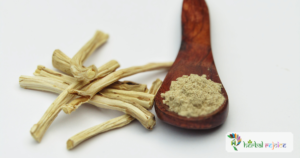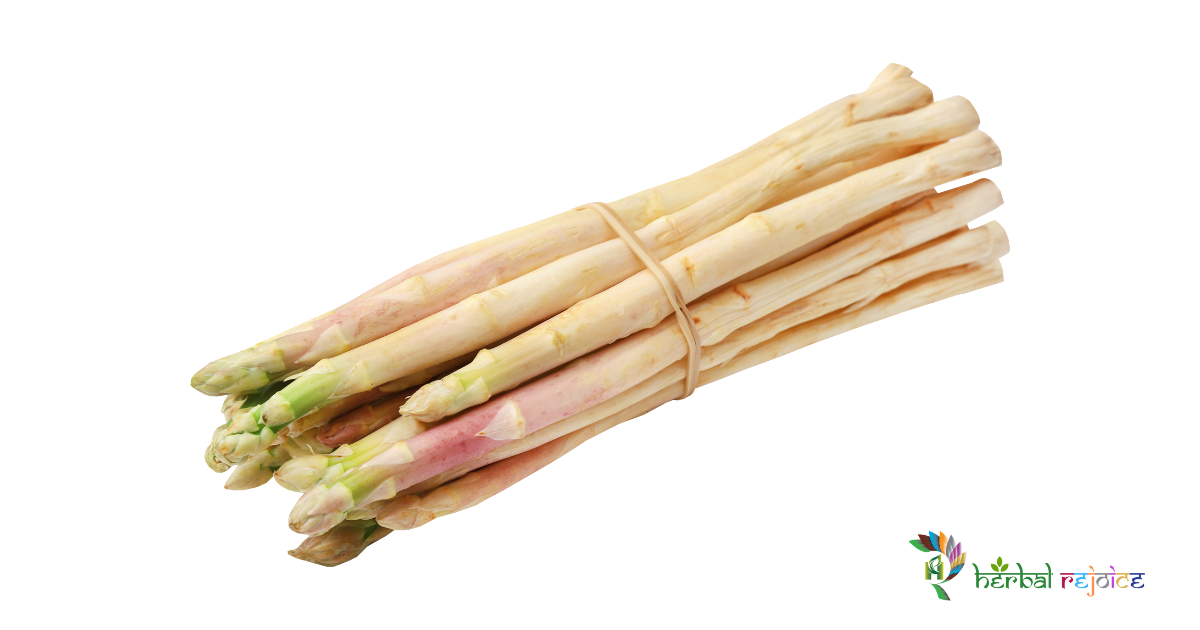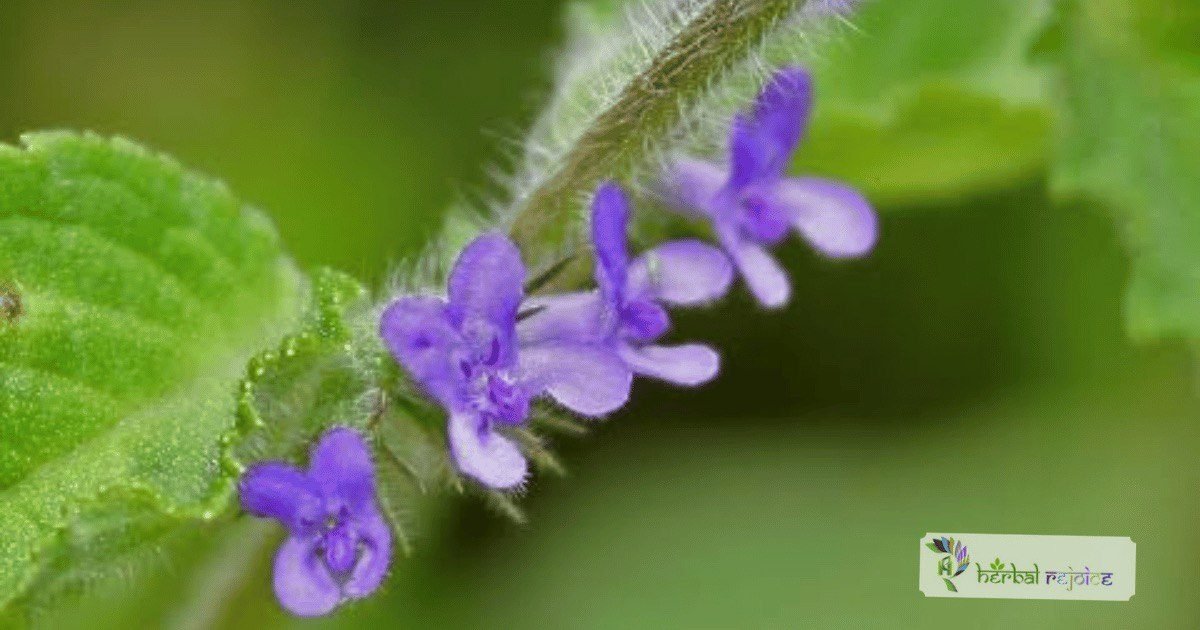Introduction
Shatavari or Indian Asparagus, scientifically known as Asparagus racemosus Willd., is a remarkable plant belonging to the Asparagaceae family.
Shatavari shows potential health benefits such as milk production in lactating women and is used to address bleeding disorders, heal ulcers.
In this extensive guide, we will delve into the English and scientific names, natural habitat, traditional uses, chemical components, and potential health benefits of Indian Asparagus.
By uncovering its attributes, we can understand the significance of this plant in traditional medicine and its potential contributions to overall well-being.
Empowering Women’s Wellness

Names and Habitat of Shatavari
Indian Asparagus, also known as Asparagus racemosus or Shatavari, is a member of the Asparagaceae family. It is found in the wild in tropical and subtropical parts of India, including the Andamans, and can be found ascending in the Himalayas up to 1,500 m.
Traditional Uses and Benefits Of Shatavari
Indian Asparagus has a rich history of traditional use and is known for its wide range of health benefits.
1. Galactagogue and Disorders of Female Genitourinary Tract:
Traditionally, Indian Asparagus has been used as a galactagogue, promoting milk production in lactating women. It is also valued for its benefits in disorders of the female genitourinary tract.
2. Styptic and Ulcer-Healing Agent:
Indian Asparagus is known for its styptic and ulcer-healing properties. It has been used to address bleeding disorders, heal ulcers, and promote overall gastrointestinal health.
3. Intestinal Disinfectant and Astringent in Diarrhea:
Indian Asparagus has been traditionally used as an intestinal disinfectant and astringent in cases of diarrhea. It may help alleviate symptoms and promote a healthy gut.
4. Nervine Tonic and Sexual Debility:
Indian Asparagus is valued as a nervine tonic and has been used to address sexual debility, promoting spermatogenesis and supporting sexual health.
Chemical Composition and Key Components Of Shatavari
Indian Asparagus contains various chemical components that contribute to its potential health benefits.
1. Saponins:
Indian Asparagus is rich in saponins, specifically shatavarins I-IV. These saponins have shown effects on uterine contractions and spontaneous motility in animal studies.
2. Bioactive Compounds:
The dried root of Indian Asparagus contains sitosterol, 4,6-dihydroxy-2-O-(2′ hydroxyisobutyl) benzaldehyde, undecanyl cetanoate, and a significant amount of saccharine matter, mucilage, and minerals. These compounds contribute to the plant’s therapeutic properties.
Potential Health Benefits:
Indian Asparagus exhibits promising potential for various health benefits.
1. Female Reproductive Health:
Due to its traditional use as a galactagogue and for disorders of the female genitourinary tract, Indian Asparagus may support female reproductive health, including milk production and the management of related conditions.
2. Gastrointestinal Health:
Indian Asparagus’s styptic and ulcer-healing properties indicate potential benefits for gastrointestinal health. It may aid in the healing of ulcers, promote a healthy gut, and support overall gastrointestinal function.
3. Nervine Tonic and Sexual Vitality:
With its traditional use as a nervine tonic and for sexual debility, Indian Asparagus holds potential benefits for promoting neurological health and sexual vitality.
Safety Precautions and Dosage Of Shatavari
While Indian Asparagus offers potential health benefits, it is essential to exercise safety precautions. It is recommended to consult with a healthcare professional before using Indian Asparagus, especially if you have any underlying medical conditions or are on medication.
The dosage of Indian Asparagus typically involves consuming 3-6 grams of dried root powder. However, it is advisable to follow the recommended dosage guidelines and consult with a healthcare professional for proper guidance.
Conclusion:
Indian Asparagus, scientifically known as Asparagus racemosus Willd., holds great potential for promoting overall well-being.
With its traditional uses as a galactagogue, styptic, and nervine tonic, Indian Asparagus has been valued for its contributions to female reproductive health, gastrointestinal well-being, and sexual vitality.
The plant’s composition of saponins and bioactive compounds further highlight its potential therapeutic applications.
While further research is necessary to explore its full range of health benefits, incorporating Indian Asparagus into traditional and modern practices can provide individuals with a natural approach to support their well-being.
Frequently Asked Questions(FAQs)
What is Indian Asparagus scientifically known as?
Indian Asparagus is scientifically known as Asparagus racemosus Willd.
Where can Indian Asparagus be found in the wild?
Indian Asparagus can be found in the wild in tropical and subtropical parts of India, including the Andamans. It can also be found ascending in the Himalayas up to 1,500 m.
What is the use of Indian Asparagus?
Indian Asparagus has been traditionally used as a galactagogue to promote milk production in lactating women. It is also valued for its benefits in disorders of the female genitourinary tract.
Can Indian Asparagus help with gastrointestinal ulcers?
Yes, Indian Asparagus is known for its styptic and ulcer-healing properties. It has been used to address bleeding disorders, heal ulcers, and promote overall gastrointestinal health.
How is Indian Asparagus beneficial for diarrhea?
Indian Asparagus has been traditionally used as an intestinal disinfectant and astringent in cases of diarrhea. It may help alleviate symptoms and promote a healthy gut.
Can Indian Asparagus support female reproductive health?
Yes, Indian Asparagus is traditionally known for its benefits in disorders of the female genitourinary tract. It may support female reproductive health and milk production in lactating women.
What are the key components of Indian Asparagus?
Indian Asparagus contains saponins, specifically shatavarins I-IV, that have shown effects on uterine contractions and spontaneous motility in animal studies. It also contains bioactive compounds like sitosterol and 4,6-dihydroxy-2-O-(2′ hydroxyisobutyl) benzaldehyde.
How can Indian Asparagus promote gastrointestinal health?
Indian Asparagus’s styptic and ulcer-healing properties suggest potential benefits for gastrointestinal health. It may aid in the healing of ulcers, promote a healthy gut, and support overall gastrointestinal function.
Is Indian Asparagus beneficial for sexual vitality?
Yes, Indian Asparagus is valued as a nervine tonic and has been used to address sexual debility, promoting spermatogenesis and supporting sexual health.
Are there any safety precautions when using Indian Asparagus?
It is recommended to consult with a healthcare professional before using Indian Asparagus, especially if you have underlying medical conditions or are on medication.
What is the recommended dosage of Indian Asparagus?
The typical dosage of Indian Asparagus involves consuming 3-6 grams of dried root powder. However, it is advisable to follow recommended dosage guidelines.
Can Indian Asparagus be used during pregnancy or breastfeeding?
It is advisable to consult with a healthcare professional before using Indian Asparagus during pregnancy or breastfeeding due to limited research on its safety during these periods.
Is there scientific evidence supporting Indian Asparagus’s health benefits?
While Indian Asparagus has a rich traditional use, further scientific research is needed to fully understand its potential health benefits.
Can Indian Asparagus be used externally?
Indian Asparagus is predominantly used internally. External use is limited.
Can Indian Asparagus be consumed as a food or supplement?
Indian Asparagus is primarily used as a herbal supplement. It is not commonly consumed as a food.
Can Indian Asparagus be used for specific health conditions?
While Indian Asparagus has traditional uses for certain conditions, it’s important to seek personalized guidance and a comprehensive approach to your health needs.
Are there any known drug interactions with Indian Asparagus?
There is limited information on potential drug interactions with Indian Asparagus. Consult with a healthcare professional if you are taking any medications.
Can Indian Asparagus be used as a natural remedy for female infertility?
Indian Asparagus has traditional use in supporting female reproductive health, but it is not a substitute for medical treatment.
Can Indian Asparagus cause any side effects?
Indian Asparagus is generally well-tolerated when used in recommended dosages. However, individual responses may vary. If you experience any adverse effects, discontinue use.





